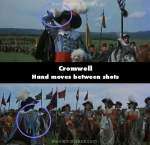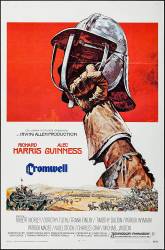Continuity mistake: At the battle of Edgehill when Crowell's cavalry and Prince Rupert's cavalry are in the middle of a melee and you can see a wound on Crowell's left arm, the same wound he receives at Naseby. It is clear that the scene was meant to be used for the battle of Naseby but was cut and used at Edgehill.

Continuity mistake: During Prince Rupert's first appearance, he greets his uncle King Charles I by doffing his hat and putting it back on. In the close-up shot he is holding his hat in place but in the wide shot his hand is on his side.
Continuity mistake: When Oliver Cromwell purges an altar of "idolatrous" candlesticks, he begins by knocking down the second from the left. In the close-up, the candlestick is standing again and he has to knock it down a second time. This happens twice in the same scene.





